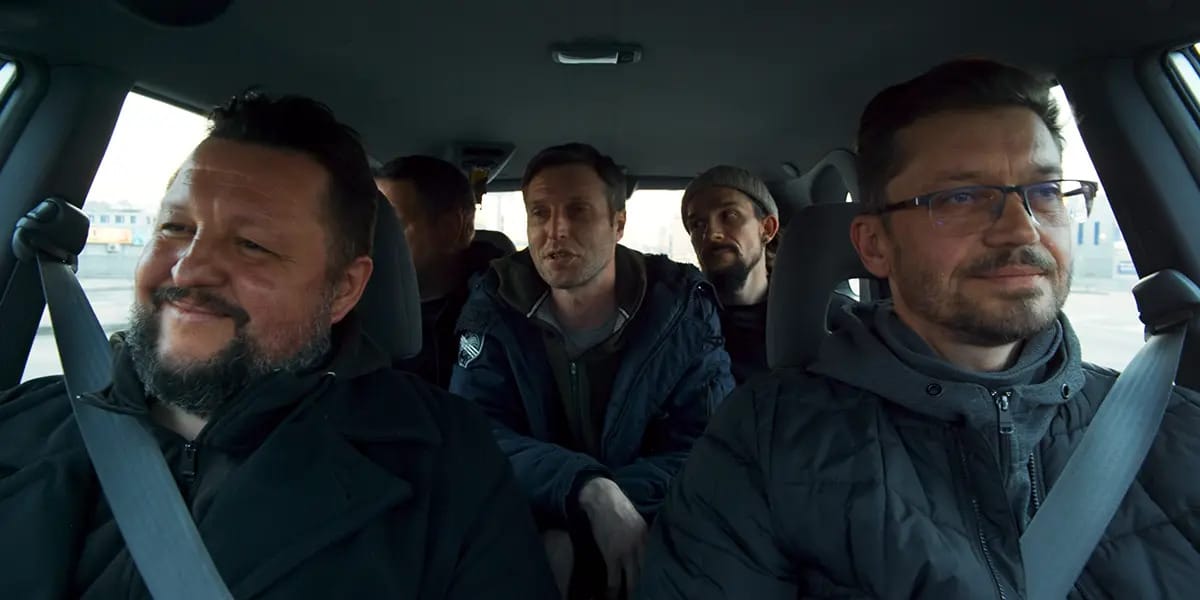To the Victory!
More hopeful than most of contemporary Ukrainian cinema.

Live from the 2025 Toronto International Film Festival.
“We have nothing in common anymore,” a wife, displaced from Ukraine to Austria, tells her husband still in Ukraine. Nothing irreconciliable hung over their marriage before the war, but the two different experiences around the conflict create new fractures. The way war completely reshapes mundane life in its aftermath is a less glorious and machismo side to armed conflict and this is why it’s less common in cinema, a medium with a preference for the “if it bleeds, it ledes” mentality inherited from journalism. A Ukrainian film that blurs the lines of fiction and documentary, redraws, and then blurs them out again, Valentyn Vasyanovych’s To the Victory! aches and longs for the return of the mundane.
The war very much persists. In his film, though, the war is over and Ukraine is starting the long process of rebuilding a devastated nation. Families are torn apart. More than 12 million nationals live abroad. The economy is in shambles and the future is bleak. Valentyn Vasyanovych plays Valyk (a name that translates to “independence” according to some sources), a film director in Kyiv returning to his craft post-war to make sense of his new world. His oldest son, Yaryk (Hryhoriy Naumov), a video game addict who takes a gap year from university, lives with him, but his wife and daughter left for Vienna during the war and found better lives there.
Driving lessons, career choices, and debates about digital vs analogue filmmaking are all important topics in To the Victory! Dads berate their good-for-nothing kids and long automobile commutes end up being the most familiar setting by the film’s end. The two smiles on Valyn and Yaryk’s faces while the former teaches the latter how to drive in the film’s departing image is the most straightforward hope for the quotidian. Wouldn’t it be nice if driver’s ed were all we had to worry about?, the film asks. A much saltier articulation of the same hope comes through a meta-filmmaker’s Q&A where Valyn and his producer appear onscreen for a foreign screening of their movie. (This scene was filmed in Lithuania; the Lithuanian Film Centre also supported the film.) The first question is the dreaded (and, in this case, completely ignorant) “where did the creative impulse for the film come from” question that someone always asks. The fucking war, I wanted the filmmakers to scream at the interviewee.
War-time documentaries that record the violence and tragedy and point fingers have their place. More novel are post-war documentaries that cross into fiction and alternate history (perhaps science fiction, depending on how one defines the future timeline). It genuinely becomes confusing to discern when Vasyanovych is playing himself (the director of this film) and when he is playing the director of the film-within-the-film, which, itself, finagles with reality. The characters within the movie also all know each other outside of the movie and their fictional vs “real” relationships are confusing to distinguish.
The best scene comes in a bit of playful dialogue between Valyk and his close friend, Vlad (Vladen Odudenko). The two are sitting down on a couch joking about how the movie they are making needs a sex scene, so Valyk jests flirtatiously and makes a queer advance on his lifelong friend. Homoerotic love is “trendy” and the festivals will love it, Valyk insists. The reflection from the television in front of them infects the picture frames behind them so that they don’t look like regular photos but kinetic newsreels. (I was informed in my interview with Vasyanovych and producer Volodymyr Yatsenko that they are watching Vasyanovych’s 2019 film Atlantis.) A red glow and siren moves in from the right, a missile siren from the film. The bleak reminder of the political reality makes the film’s longings for mundane concerns all that much more tender.
The future the film imagines is more hopeful than most of contemporary Ukrainian cinema. There is no indication of a foreign troop presence, no mention of land concessions, and sadness seems to have replaced fear as the dominant emotion. The resilient and proud skyline of the capital consistently defines the horizon of the cinematography, an assertion that the city still stands and it stands with pride. To the Victory! makes claims for the future of Ukraine; that’s why it works so well.